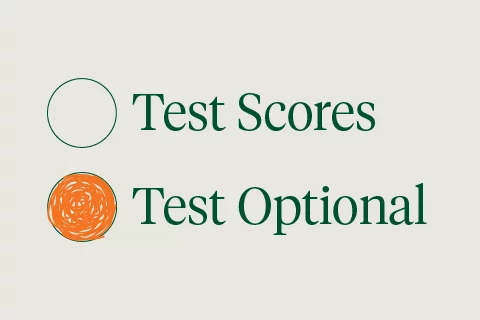Partially due to the widespread impacts of COVID-19, many colleges and universities (over 1,600 across the US, to be specific) are becoming test-optional institutions.
However, the term “test-optional” is quite nuanced.
Therefore, before diving into answering the question “Is Test-Optional Right for Me?”, I will start by going over the proper definition and breakdown.
Then, because there are many things to consider when choosing to apply to test-optional schools, I will provide you with some helpful information to guide you in successfully making that decision.

At its core, the term “test-optional” in relation to a college or university means that that school does not require some or all of its applicants to submit test scores in order to be considered for admission.
This means that scores from standardized tests such as the SAT or ACT are not required. However, other test scores, such as AP exams, would still be needed to verify credits earned.
Because test-optional schools do not factor your SAT or ACT into their decision-making model, they do put more weight on components such as level of rigor with classes taken, extracurricular activities, community service, and personal statements to make their decisions.
One key thing to note about schools that are test-optional is that many of them still use test scores to determine merit aid awards. So, if you are looking to potentially earn scholarships or grants from your school of choice, consider submitting a test score even if the school is test-optional.

It is important to point out the difference between a school that is “test-optional” and a school that is “test-blind”.
The term test-blind means that ACT and SAT scores will not be considered for admissions or merit aid. Test-blind schools will not even look at your scores if you do submit them.
Currently, approximately 65 schools across the US are completely test-blind; notable contributions to this list include the University of California school system.
Students who struggle with standardized test-taking may choose to go the test-optional route when applying to schools.
Maybe you have already taken both tests and decided that your scores were not an accurate reflection of your abilities and potential. If you didn’t do as well on either test as you would have liked, try to think about the alternatives you can offer on your application that may be able to supplement a lack of test scores. Students with artistic skills may also want to showcase those talents if their test scores do not make them stand out among other applicants.
Additionally, the impacts that the COVID-19 pandemic has had on some students' abilities to actually sit for these tests at testing centers is also another major reason why so many schools are now becoming test-optional.
So, if this sounds like you, then we suggest you definitely do some brainstorming and digging into ways that you can look to differentiate yourself from other applicants since you may not be able to submit a test score.
As mentioned above, students who choose to go test-optional can offer schools creative portfolios, including creative writing, drawings, photographs, sculptures, dance routines, or other artistic demonstrations.
Additionally, students may also choose to enroll in advanced classes (AP or IB), take SAT Subject Tests, or submit other educational evidence with their applications that prove they are strong students.
Each school has its own set of rules for who can use which applications and why. Some test-optional schools make submitting test scores optional for all students; other schools, however, have restrictions for who can use that route.
Sometimes schools allow students who choose to forego test scores and take placement tests to replace the standardized test scores in terms of helping students figure out which classes they should be starting out in to have the greatest chance of success.
Without an SAT or ACT score, the schools would not have adequate information to help students succeed. Therefore, placement tests are used to ensure that students are not taking classes that are too challenging for them from the get-go.
No one can answer what you should do, but you. However, we do recommend that you do your research and consider all the options that are available to you, given the circumstances.
First, take a look at the list of schools you are thinking about applying to and do some research on their admissions pages to find information on their policies regarding test-optional.
Once you have gone through all of the schools on your list and identified which category each school falls into, you will be able to better assess your options. This website offers a wealth of information and resources on test-optional and test-blind colleges and universities throughout the US - I highly suggest you check this out as well!
Next, consider taking the time to think about why you might be choosing to opt-out of standardized test requirements.
Do the new requirements make you seem less appealing to schools or more desirable? You should weigh your options and level of competitiveness at each school for which you want to apply, taking into account your profile with and without your test scores submitted. You might choose to skip the test scores at some schools and use them at others.
Ultimately, if you can improve your candidacy by submitting either an ACT or SAT score to a test-optional school, or if you are looking for merit-based aid (as most students are!), you should highly consider taking standardized tests and using those scores.
This guest blog post was contributed by Kevin Organiciak, Founder and Chief Learning Officer of TPAPT.
If you're looking for more reading on test-prep related topics, check out our other recent post on SAT vs ACT!